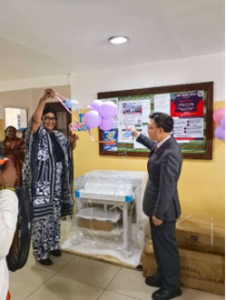Ghana’s poultry sector, particularly in the Dormaa area, stands poised for significant growth with the government’s renewed commitment through the Feed Ghana project. Deputy Minister for Food and Agriculture, John Dumelo, emphasized the government’s targeted support for large-scale poultry farms, specifically those capable of raising 200,000 to 250,000 birds. This strategic focus aims to leverage existing capacity and rapidly increase domestic poultry production. Dormaa’s established infrastructure, including numerous incubators for day-old chicks, presents a unique opportunity to reduce reliance on imported chicks, a critical factor in strengthening the local poultry industry and enhancing Ghana’s food security. The government’s direct assistance to these farms will be instrumental in scaling up operations and increasing output, driving down reliance on imports and bolstering the national economy.
A core element of the Feed Ghana initiative is the development of a comprehensive national egg management strategy. The Deputy Minister underscored the urgency of this strategy to minimize post-harvest losses and ensure that poultry farmers receive fair value for their produce. Currently, a significant portion of egg production goes to waste due to inadequate storage and distribution networks. A robust national strategy will address these challenges by improving storage facilities, optimizing transportation logistics, and potentially exploring value-added processing options. This will not only increase farmer incomes but also contribute to the availability and affordability of eggs for consumers, improving nutrition and food security nationwide. This integrated approach highlights the commitment to supporting the entire poultry value chain, from production to consumption.
Collaboration between government and private institutions is crucial for the success of the Feed Ghana project. The Deputy Minister emphasized the need for a synergistic partnership to effectively implement the program’s objectives. This collaboration will involve sharing expertise, resources, and market insights to create a conducive environment for poultry farming. Private sector involvement will be essential in areas such as feed production, processing, and marketing, complementing the government’s efforts in infrastructure development and policy implementation. This public-private partnership model will foster innovation and ensure the sustainability of the poultry sector’s growth.
Despite the promising prospects for the poultry sector, farmers face significant challenges, particularly concerning access to finance. High loan interest rates are a major constraint, pushing many farmers into financial distress and hindering their ability to expand operations. This financial burden limits investment in critical areas such as improved infrastructure, modern equipment, and quality feed, ultimately impeding productivity and growth. Farmers appealed for government intervention to address this issue, advocating for more accessible and affordable financing options specifically tailored to the agricultural sector. This includes exploring subsidized loan programs, providing loan guarantees, and strengthening the capacity of rural banks to effectively serve the agricultural community.
Beyond financial constraints, farmers also highlighted the need for additional government support in the form of vaccination machines and improved logistics. Access to vaccination machines is critical for disease prevention and maintaining the health of poultry flocks. This proactive approach can significantly reduce losses from disease outbreaks and contribute to the overall sustainability of poultry farming. Improved logistics, including better transportation networks and cold chain infrastructure, are essential for efficient delivery of poultry products to market, minimizing post-harvest losses and ensuring product quality. These infrastructural improvements will enhance the competitiveness of the local poultry industry and facilitate access to wider markets.
The detrimental impact of imported poultry on the local industry was another key concern raised by farmers. They advocated for a decisive ban on poultry imports to protect local producers from unfair competition and create a level playing field. Imported poultry, often subsidized in their countries of origin, can be sold at lower prices, undercutting local producers and threatening the viability of domestic poultry farms. A ban on imports would provide a much-needed respite for local farmers, allowing them to compete effectively and expand their market share. This protectionist measure would be crucial in nurturing the growth and development of the domestic poultry industry.
The potential for integrating poultry farming into educational institutions, like Dormaa Senior High School, adds another dimension to the Feed Ghana initiative. The school’s Headmaster expressed interest in diversifying into poultry and cashew farming, leveraging the existing agricultural department to boost food production and provide practical training for students. However, the lack of financial resources poses a significant barrier to realizing this vision. Government support in the form of grants, subsidized loans, or infrastructure development could empower schools like Dormaa Senior High to become self-sufficient in food production while simultaneously training the next generation of agricultural professionals. This integrated approach not only addresses food security concerns but also contributes to skills development and youth empowerment in the agricultural sector. The school’s existing vegetable farming program demonstrates its commitment to agricultural education and provides a solid foundation for expanding into other areas like poultry and cashew farming. This initiative also aligns with the broader goal of promoting agricultural entrepreneurship among young people, creating opportunities for them to contribute to the growth of the agricultural sector and the national economy.














